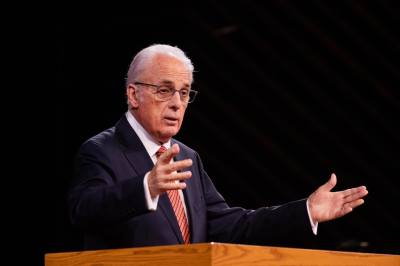John MacArthur vs. Christian nationalism

California megachurch pastor and popular author John MacArthur recently denounced Christian nationalism as impossible because God’s Kingdom is not of this world. Now age 84, MacArthur pastors a nondenominational church with a Calvinist and Baptist theology that is premillennial (Christ comes before the millennium) and dispensationalist (end times theology with rapture etc.).
Self-identified Christian nationalists are Calvinists, often Presbyterian, who believe in a Christian confessional state and are more inclined to postmillennialism in which the earth is subdued for Christ before His return.
Since MacArthur is outspokenly theologically and politically conservative, many critics of Christian nationalism might assume he is a Christian nationalist. In his recent comments, MacArthur sounds more like an old-style Baptist separatist:
The Kingdom of God is not of this world. Jesus said, ‘My kingdom is not of this world. If my kingdom were of this world, my servants would fight.’ His Kingdom is not of this world. The kingdom of this world is a separate world. They’re not linked together.
And:
Nothing that happens in any nation, whether it’s a communist nation, a Muslim nation, or a quote-unquote quasi-Christian nation, or an atheistic nation, nothing in that nation — politically, socially — has anything to do with the advancement of the Kingdom of God. Because the Kingdom of God is separate from that system. God, in His sovereignty, is building His Church, and the gates of Hades will not prevail against it, Jesus said.
And:
So the idea that you should link up some political effort, some political process, some social process, some gain of power or influence in a culture as part of the advance of Christianity is alien to Christianity. You never have our Lord approaching anything like that, nor the apostles, and particularly the apostle Paul; he sought to gain no favor with the Roman Empire whatsoever, or for that matter with any other of the rulers that he ran into during his life.
And:
We don’t win down here, we lose. You ready for that? Oh, you were a postmillennialist, you thought we were just going to go waltzing into the Kingdom if you took over the world? No, we lose here — get it? It killed Jesus. It killed all the apostles. We’re all going to be persecuted. If any man comes after Me, let him’ — what? — ‘deny himself.’ Garbage of prosperity Gospel. No, we don’t win down here. You ready for that? Just to clear the air, I love this clarity. We don’t win. We lose on this battlefield, but we win on the big one, the eternal one.
Self-identified Christian nationalists do expect Christians of their perspective to “win down here” before Christ’s return by establishing a Christian confessional state that subdues public dissent from their brand of Christianity. Such Christian nationalists disdain MacArthur’s 20th-century brand of premillennial dispensationalism that assumes the church’s role is chiefly saving souls before the end times.
MacArthur’s brand of Christianity has tens of millions of adherents in America with enormous religious, social, and political impact. Left Behind literature and filmography reflect their perspective, as do evangelical broadcasts like The 700 Club. The modern Religious Right, founded in the 1970s, shared his pessimistic view. They wanted greater political righteousness in America, as MacArthur does, to forestall divine judgment and permit more years of evangelism. But they did not claim or desire that a Christian nation could be instituted by law. (See my piece on “Christian Conservatism vs Christian Nationalism.”)
Self-identified Christian nationalists are much fewer in number. They are more intellectual and subscribe to 16th and 17th-century Calvinist theories about political rule by the elect. They are obviously much more optimistic than are Christian dispensationalists. But the latter have had wide political influence through voter mobilization and issue advocacy, while the former have had little direct political influence, at least not yet.
Although still very influential, especially among Pentecostals, Christian dispensationalism is declining. Its chief promoters are, like MacArthur, older, retired, or gone. It’s becoming rare to find young American Christians who are ardent dispensationalists. The emerging dominant perspective, common in much of evangelical nondenominational Christianity is amillennialism, which avoids choosing between premillennialism and postmillennialism. This perspective is typically pragmatic, focused on personal testimony and practical living, while avoiding debated cosmic issues.
As Christian dispensationalism continues to decline, more Christians who have been taught a vague amillennialism might desire a more dogmatic, systematic alternative. Christian nationalism offers a robust roadmap for implementing God’s purpose through government. It has clear marching orders for enthusiastic Christians who want to transform society. And while Christian dispensationalism warns of inevitable persecution and cataclysm, Christian nationalism offers rule by the right kind of Christians. Contrary to MacArthur’s warning, Christian nationalists “win” on the battlefield. That message obviously can be appealing, far more so than “losing.”
And that soaring message can also lead to political failure and disenchantment. Christian Realism cautions against these dogmatisms. Christian dispensationalism has sometimes been prone to apocalyptic urgency followed by exhaustion. Christian nationalism seeks to systematize and implement what is likely outside human reach. Both demand certainty when perhaps mystery and patience are preferable.
Originally published at Juicy Ecumenism.





















